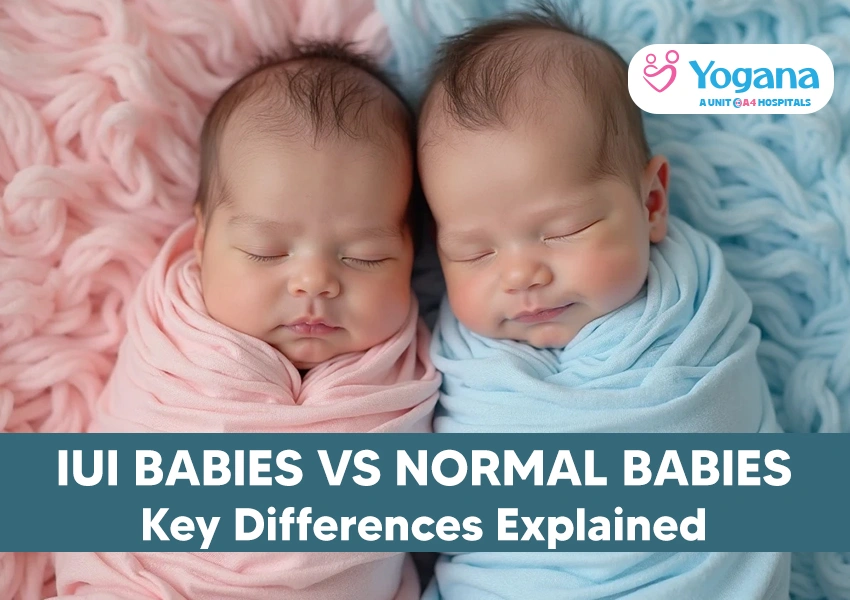IUI Babies vs Normal Babies: Key Differences Explained
According
to a recent study, around 10 to 15% of couples in India struggle to conceive a
baby naturally. This may happen due to disorders in either men or women or
sometimes in both. Some of the disorders may include:
- Sperm abnormalities,
- Problems with the
male reproductive tract,
- Hormonal imbalances
affecting both males and females,
- Unhealthy fallopian
tubes,
- Ovulation disorder,
- Uterine problems, and
more.
Whatever
the reason may be, the inability of a sperm and an egg to meet and unite can
significantly affect the successful process of fertilisation and implantation.
In
this blog, let’s explore the key differences between IUI babies vs normal
babies to avoid misconceptions and misunderstandings.
What is an IUI?
IUI
full form in medical context is intrauterine insemination. This is often
considered the first line of fertility treatment, especially for couples with
unexplained infertility. Your healthcare provider may suggest the IUI procedure
as an initial step since it involves no invasive methods. It is also preferred
as the procedure is less expensive and can be performed within 30 minutes.
The
IUI procedure is done by injecting the concentrated healthy sperm into the
woman’s uterus. It is particularly performed during the ovulation period, which
may generally enhance the chances of successful fertilization.
Why is an IUI Procedure Performed?
The
IUI treatment may be suggested by the healthcare provider in any of the
following scenarios:
- IUI can potentially
be the initial treatment option for couples when the cause of infertility
is unknown.
- If the male partner
has slightly decreased sperm count and motility.
- IUI is performed if
the woman has problems with cervical mucus as this will bypass the barrier.
- Some women may
experience allergic reactions towards their partner’s sperm. The prepared
and concentrated sperm can help to avoid the issue.
- Some women may
struggle to have intercourse vaginally due to psychological or physical
conditions. In such cases, an IUI procedure may be suggested by the
healthcare provider.
- If the male partner is found to have an extremely low sperm count, IUI may be suggested with donor sperm.
Key Differences between IUI Babies and Normal Babies
Conception Method
The
conception method is the primary and can be said as the only difference found
between the IUI and normal babies. IUI babies are usually conceived through the
procedure, which involves injecting the father’s or donor’s sperm inside the
mother’s uterus. While the natural conception happens through regular sexual
intercourse without protection.
Treatments and Preparations
When
it comes to conceiving a baby through an IUI procedure, hormone stimulation and
ovulation induction medications are prescribed by the fertility expert. These
fertility medications are essentially helpful to boost the development of eggs
in the ovaries. Because of this, the chances of uniting the sperm with an egg
are predominantly increased, specifically through the procedure. However, these
medications are not generally required to conceive a baby naturally. Having
intercourse without protection around the time of ovulation is all it needs.
On
the other hand, the IUI procedure can be performed either with or without these
additional medications. They are primarily decided by the fertility expert
depending on the couple’s underlying cause of infertility and specific
circumstances.
Pregnancy and Delivery
The
pregnancy and delivery process may typically be the same for both IUI babies
and normal babies. Conceiving through the IUI procedure doesn’t alter anything.
Throughout both of these pregnancies, regular prenatal care is highly suggested
to deliver better health for the mother and the baby.
Genetic Screening
In
certain scenarios, your healthcare provider may recommend performing the
genetic screening of the sperm or the woman right before the IUI procedure.
Genetic screening may especially be recommended when the donor sperm is
utilized. This is to ensure the potential hereditary disorders that could
negatively affect the IUI success or the risk of a fetus inheriting the
condition. Genetic screening is mostly performed on individuals, particularly
those with conditions like sickle cell anaemia, sex-linked disorders, or cystic
fibrosis. The testing is considered an essential step for couples as it offers
a clear determination of the well-being of their future baby.
This
could not be the case with natural conception. Genetic screening, in general,
may be recommended by the healthcare provider if any abnormalities are
indicated in the prenatal testing after conception. This is to ensure a precise
diagnosis.
Health and Development
Recent
studies show that there are no significant differences found in the IUI
conceived babies and naturally conceived babies. They claim that both of these
babies have attained similar developmental milestones in terms of physical and
mental health. Conceiving through fertility treatments like IUI does not
necessarily modify the genes of the growing baby to exhibit any health and
developmental disorders. Instead, the fertilization process may indeed take
place in the womb of the mother. Only the method of conception varies.
Social and Cultural Perceptions
Social
and cultural perceptions are one of the significant differences in conceiving
the baby through IUI. The sigma, discrimination, and concealment are indeed
true when it comes to conceiving the baby through fertility treatments like
IUI. The pressure of being unable to conceive naturally, specifically from family
members can predominantly impact the self-esteem and distress in women.
However, the acceptance and awareness of fertility treatments in the present
days have resulted in minimizing the judgement and criticism surrounding
infertility.
Note
that understanding the complexities associated with fertility is crucial to
breaking social comparisons and misconceptions.
Pregnancy and Birth Outcomes
Conceiving
through IUI treatment does not generally exhibit the possibility of multiple
gestations. However, medications that are used for hormone stimulation and
ovulation induction may slightly increase the risk of conceiving twins or
triplets, sometimes even more. Studies show that conceiving multiple gestations
through the procedure could rarely be an IUI babies disadvantages.
On
the other hand, the risk is significantly minimized when it comes to conceiving
the baby naturally. Yet, the complications do exhibit even in natural
conception. This may typically depend on the couple’s age, lifestyle factors,
or underlying medical conditions like diabetes.
Note
that the complications ascended by the IUI can generally be managed through
regular medical administration.
Disclosure to the Child
It
is important to recognize that the disclosure of how you conceived the child is
a personal choice. However, many experts suggest having open communication with
the child at the most appropriate age, especially if it’s through donor
gametes. This will help the child to better understand their parent’s unique
conception story of bringing them into their life. The openness can also
significantly manifest to develop a bond and trust between the child and the
parents.
IUI vs Natural Conception Success Rate
According
to a recent study, the success rate of intrauterine insemination (IUI) is surprisingly
lower when compared to natural conception. The success rates of natural
conception may fall anywhere between 20 and 25% per month. Whereas the numbers
may get higher if the woman is younger. A significant decline in success rates
may be noticed if they are older.
However,
the success rates of IUI conception may usually fall anywhere between 10 and
20% per cycle. The success rates may largely increase through multiple attempts
by potentially reaching 40 and 50%.
Summary
To
conclude the debate over IUI or IVF babies vs normal babies, much research
demonstrates that there are no significant differences in the health and
development of these babies. IUI babies are just as healthy and active as
babies that are born naturally. The only key difference is the method of
conception. Even though IUI conception is associated with a slightly increased
risk of multiple gestations, the benefits it exhibits can predominantly
outweigh these risks.
Frequently Asked Questions (FAQs)
Q: Can I have a healthy and normal delivery through IUI?
A:
The answer to the question is yes. It is quite possible to have a healthy and
normal delivery through the IUI procedure. The mode of delivery may
significantly be dependent on the mother’s and baby’s health. Rather, it has
nothing to do with the method of conception.
Q: What are the five common myths of IUI babies?
A:
Several misconceptions and misunderstandings surround the IUI babies. Some of
them may include:
- IUI procedure is an
invasive and painful treatment.
- IUI is ideal for only
women-related fertility problems.
- Babies conceived
through IUI have health and developmental issues.
- IUI always results in
100% pregnancy with multiple gestations.
- IUI babies do not
bond with their parents.
Q: Can I conceive naturally after conceiving and delivering my first
child through the IUI procedure?
A:
The answer to the question is yes. You can certainly conceive naturally even
after successfully conceiving and delivering a baby through an IUI procedure.
It is important to understand that IUI procedures do not permanently disrupt
the ability to conceive naturally.
Q: Should I tell my child that she is conceived through IUI?
A:
The disclosure of how the child is conceived is a personal choice. However,
many experts suggest having open communication with the child at the most
appropriate age, especially if it’s through donor gametes. This will help the
child to better understand their parent’s unique conception story of bringing
them into their life. The openness can also significantly manifest to develop a
bond and trust between the child and the parents.
Q: What are the ethical and legal considerations of conceiving a baby
through IUI?
A:
Conceiving through intrauterine insemination (IUI) procedure in India involves
the regulation of the Assisted Reproductive Technology Act, 2021. The act is
aimed at regulating and supervising ART clinics and banks to ensure their
ethical practices, prevent misuse of ART services, and protect patient rights.
It is also aimed at strictly keeping the details of the sperm donor
confidential.


